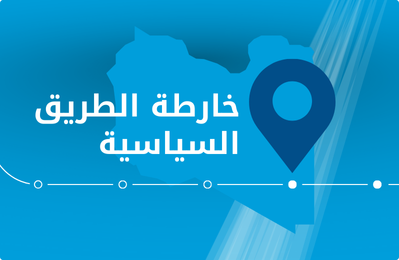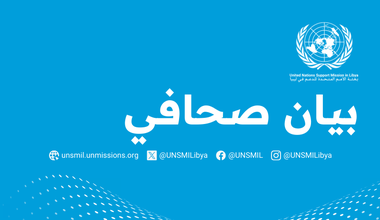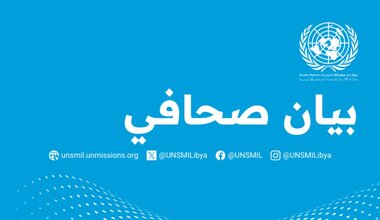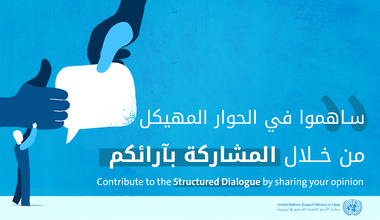مقابلة مع إيان مارتن، الممثل الخاص للأمين العام في ليبيا، 6 آب/أغسطس 2012(بالانكليزية)
الممثل الخاص للأمين العام في ليبيا إيان مارتن، في مقابلة مع مركز أنباء الأمم المتحدة في مقر الأمم المتحدة في نيويورك في ٦ آب/أغسطس ٢٠١٢، يتحدث عن أول انتخابات في ليبيا منذ أكثر من 40 عاما، ودور الأمم المتحدة في ليبيا والتحديات التي يواجهها هذا البلد.
6 August 2012 – Libya recently held elections for a National Congress – its first free polls in more than four decades.
The voting was a key step in the North African country's first peaceful and democratic transfer of power in the wake of a pro-democracy uprising last year – similar to the protests in other countries in the Middle East and North Africa – which led to civil war and the end of the 42-year-old regime of Muammar al-Qadhafi.
Considering the country's lack of electoral experience and a hugely demanding timetable, the holding of the elections was widely considered a notable accomplishment by the international community.
The Secretary-General's Special Representative and head of the UN Support Mission in Libya (UNSMIL), Ian Martin, was on the ground in Tripoli for the vote. During a recent visit to UN Headquarters and ahead of the end of his posting with UNSMIL, the UN News Centre spoke with Mr. Martin about the elections, the UN's role and Libya's prospects for the future.
UN News Centre: What's your take on Libya's recent elections?
Ian Martin: Libya has crossed an extremely important milestone in its transition to a democratic state and it's done it in a very short period of time.
It's not yet a year since the National Transitional Council was seated at the General Assembly, and even after that, fighting went on until what the call the 'Declaration of Liberation' in late October.
They set themselves a very ambitious timetable for when these first elections would take place, and they've happened more or less on schedule, and in a better context than almost anybody would have been prepared to predict.
UN News Centre: Have the elections enhanced expectations about what Libya can achieve in the short- to medium-term?
| ... both Libyans and the international community are going to have to realize that building a state out of a legacy of 42 years of a regime that deliberately didn't develop the institutions of a modern democracy is not a quick task |
Ian Martin: Expectations have always been very high – but it's certainly true that the interim Government was only regarded as just that, and didn't itself feel that it had a mandate to take long-term decisions until there was an elected Government; so yes, I think it's true that expectations will now be even higher.
But both Libyans and the international community are going to have to realize that building a state out of a legacy of 42 years of a regime that deliberately didn't develop the institutions of a modern democracy is not a quick task.
UN News Centre:
What are the main problems facing Libya at the moment?
Ian Martin: Well, Libya is a country with enormous resources for its relatively small population – that's a blessing, obviously. But an economy that is only dependent on oil and has a very large public sector has a real problem in diversifying its economy in a way that will provide employment for growing numbers of young people – some of whom became the revolutionaries of last year.
In addition to that, it faces major security challenges. The transition from the revolutionary brigades that were there at the end of the conflict, to state security forces having a monopoly on force, a national army and a proper police force – that can't be created overnight. The majority of the revolutionaries don't want to be in the security sector, they want civilian occupations – that's a big challenge. Libya has enormous borders, particularly its southern border is open to the trafficking of people, weapons, drugs – getting a grip on that is a huge challenge.
And we've seen the outbreak of a number of local conflicts – which is not surprising, they're conflicts that have long roots – and, indeed, were there during the al-Qadhafi period and in many ways were exacerbated by the al-Qadhafi [regime's] actions, but that's going to need the attention of an elected government and elected representatives.
UN News Centre:What are underlying issues behind those security concerns?
| During a visit to Tripoli, Secretary-General Ban Ki-moon, accompanied by SRSG Martin, meets with survivors of the killings at a warehouse in the Salahaddin area, where detainees were reported to have been tortured and executed by the Qadhafi regime in August 2011. UN Photo/Evan Schneider |
Ian Martin: It's the question of how one moves [on] from the revolutionary brigades, which have continued to be an important provider of security... ever since the end of the conflict, much of the security in towns and cities, in the absence of a robust police force or a sizable neutral army, has been provided by the brigades.
Now, there are some who are ill-disciplined and there have been serious abuses that continue – abductions, detentions, ill treatment by some of those brigades – but the leadership of the local military councils, the majority of the brigades, is a responsible leadership, which does not, I think, want to challenge state authority. Indeed [they] want to see the transformation that they fought for last year – but will only be ready to disarm and disband when sensible decisions are taken about the future of those who make up the brigades, and when the State capacity is there to hand over to.
UN News Centre: There have been reports of parts of Libya seeking more of a say in the distribution of power and resources. How does that play into the country's future?
| A wide view of the Security Council as Members unanimously adopt resolution 2040, which extended the mandate of UNSMIL by one year. UN Photo/Mark Garten |
Ian Martin: The roots of that go back to the origins of independent Libya, which - not many people in the United Nations remember - was brought into being by a United Nations commission, in 1950-51, that negotiated the first constitution, and Libya was formed out of the three former provinces of the Ottoman Empire – Cyrenaica, Tripolitania and Fezzan. At the very beginnings of the state, a major issue was: is it going to be a federal state? Which, indeed, it was from 1951 to 1963.
Eventually, a more unified constitution and what balance of representation should there be between the population, which is heaviest in the west, and the regions [needs to be considered]. Then you add to that that the east was deliberately marginalized by al-Qadhafi – it didn't like him, he didn't like it – and add to that Benghazi's sense that it was where the revolution begun.
The east is certainly determined that it should have a full part in the future constitution-making and governance, and there's a very general sense that Libya has been too centralized a state, and it's not only in the east, it's other parts – certainly the south and even parts of the west – that were neglected in an over-centralized authority from Tripoli. So, there are major decisions about future constitutional arrangements and the decentralization of government.
UN News Centre: Where are things at with Libya's constitution-making process?
| During a visit to the eastern town of Ajdabiyah, SRSG Martin looks at photographs of fighters who fell in the struggle against the regime of former Libyan leader Muammar Qadhafi. Photo: I. Athanasiadis/UNSMIL |
Ian Martin: Well, the National Congress now has to decide how the constitutional commission that will actually draft the constitution is going to be composed. There was a last-minute decision by the outgoing National Transitional Council that it should be elected by the three regions rather than selected by members of the National Congress themselves. But that's something that now is going to be under discussion between the newly-elected political leaders and people, particularly in the east, who felt most strongly about the case for equal representation.
So, we have to see how the body will be composed and then it can get down to business, and the United Nations will be ready to assist with that stage of the process and the constitutional referendum, and then eventually, the first elections under a new constitution.
UN News Centre: Do you see problems with public acceptance of people such as politician Mahmoud Jibril, who had prior links to the al-Qadhafi regime?
Ian Martin: There will go on being a debate for a long time, about the records of different individuals who worked for periods inside the al-Qadhafi regime – although, in general, those who made an immediate break in February last year are regarded as having made an important contribution to the revolution. Certainly he [Mahmoud Jibril] did so, as a major mobilizer of the international support to Libya during last year.
UN News Centre: What role do tribal rivalries and loyalties play in Libya today?
Ian Martin: That's a question that Libya experts disagree on! There are many ways
| SRSG Martin is shown bomb damage during a tour of a university complex in the eastern oil town of Breqa. Photo: I. Athanasiadis/UNSMIL |
in which the tribes play a positive role, in social networks, and indeed, while on the one hand tribal divisions can be part of local conflicts, the tribes actually have considerable mediation capacity and issues are worked out between them. And, of course, the bulk of Libya's population now is young and lives in the mixed cities of the coastal strip.
So I think there's a tendency on the outside to exaggerate the view of Libya as a place of warring tribes. I hope we'll see that tribes will be playing a positive role in the new Libya, but the form of democracy will be – as this election shows – a modern, representative democracy.
UN News Centre: What has the role of UNSMIL been up until now and how will it change in the immediate future?
Ian Martin: Our main work has been in three areas. The first has been support for the democratic transition, and the first phase of that has been the election and we've had a sizable electoral team, at its peak some 55 international experts helping with the elections – it's actually not a very large number compared with the role the United Nations has played elsewhere – but I think it's been of obvious importance given that the electoral authorities in Libya started out with absolutely no experience whatever, and had to build an electoral machinery from scratch. And that role will continue through the constitution-making to the future constitutional referendum and later elections, if that's what the Libyans want.
| SRSG Martin is greeted by a delegation of elders during a visit to the western town of Yifrin. Photo: I. Athanasiadis/UNSMIL |
The second major area is support to the security sector, to the development of the police force – we have had a police advisory team working with the Ministry of Interior and the police from the beginning. We've been doing a good deal of work with the army as well, coordinating international expertise, helping the Libyans draw up a first defence white paper, to conceive of security forces being under proper democratic control. That also includes the areas of border security and management of arms and ammunition, and the eventual demobilization and reintegration of the members of the brigades.
And then the third area is human rights, transitional justice, [and] the rule of law, where there's a major legacy from the past that has to be confronted: missing persons, fate uncovered as far as possible, victims assisted, the worst perpetrators brought to trial in fair proceedings, and a problem of the continued detention of those detained at the end of the conflict, rightly or wrongly, where the State capacity to screen those cases and deal with them properly within the law hasn't yet full existed.
So those three areas remain as valid today as they were in the period in the run-up to these last elections, I think. Of course, once there's a new Government, the UN will discuss with that Government its wishes for the UN role, but it doesn't appear that there's any reason why those three areas would not continue to be the main focus for the work of UNSMIL, in cooperation with UN agencies. And of course, the UN funds, agencies and programmes are active across a much broader area of capacity development.
UN News Centre: What is the situation of Libya in regard to mines, unexploded
| SRSG Martin awards a certificate to a member of the Libyan national police, during a ceremony in Tripoli. Officers graduated from a course intended to prepare them for assuming their responsibilities and guaranteeing security in the country's recent national elections. Photo: I. Athanasiadis/UNSMIL |
ordnance and unsecured weapons?
Ian Martin: Libya ha a colossal problem of mines and unexploded ordnance. It actually has a Second World War problem, it has a Chad-Libya problem in the south, and it now has the problem of the munitions used during last year, as well as the extraordinary array of weaponry and ammunition that al-Qadhafi had assembled that ceased to be secured in the disorder of the fighting last year.
That, of course, is of great concern to Libya's neighbours, as some of it has begun to be trafficked out of Libya, although much of it is still in Libya and the UN Mine Action Service (UNMAS) is working with the Libyans to try to secure what is in Libya, and make sure it's safely stored and disposed of when they decide to do that.
It's a major task that will go for some time. It will also require mine risk education that the UN Children's Fund (UNICEF) is involved in. As long as the contamination is still there, as it is in major areas, it's a very major challenge for a long time to come.
UN News Centre: How do events in Libya over the past year compare to similar events in the region? Are there lessons to be learned?
Ian Martin: I think Libya is very much its own place. I've been asked several times how it's been influenced by what's happened its neighbours; the influence is at the time of the uprisings in Tunisia, Egypt, Libya – there the sort of influences are obvious, but the situation as left in each of those three countries and elsewhere is very, very different and therefore has to be looked at on its own terms.
| SRSG Marrtin walks about the damaged centre of Zawia, a town that saw fierce fighting during the 2011 Libyan uprising. Zawia was one of the first cities to rise against the regime of Muammar Qadhafi and one of the last to be liberated in August 2011. Photo: I. Athanasiadis/UNSMIL |
UN News Centre: With so much else happening around the world, has the international community's attention on Libya waned?
Ian Martin: I think there is still a strong international desire that Libya succeeds in its transition. Libya's needs are limited. It doesn't need donor funding because it's a country with very considerable resources of its own. It has a lot of skilled personnel, but what it doesn't have is experience of well-functioning state institutions.
So the need is mainly one for technical assistance – fairly precise, well-targeted technical assistance – as requested by the Libyans. That's what we're trying to provide through the UN, but also to coordinate the provision through other bilateral and multi-lateral actors. Libya doesn't need major international donor conferences, but it does need the sustained support of those who can provide the right kind of technical assistance.
UN News Centre: Where do you see Libya in five years?
Ian Martin: Libya has tremendous possibilities because of its wealth in relation to its population, because of its wonderful coastline as well as its desert areas, because of the most extraordinary Roman and Greek remains still only partially excavated. It's a country with enormous positive potential that can be a benefit to not only its citizens but to its neighbours too, because it needs the support of migrant labour.
That, of course, requires effective governance. And I hope that this first election is an important step to there being a Government with full legitimacy, to the emergence of political parties – only partially formed for this election – and a functioning state which in five years could really be a positive feature in its region.
Special Representative of the Secretary-General Ian Martin is interviewed by Ari Gaitanis of the UN News Centre. Credit: UN Webcast
UN News Centre: What was it like for you on the ground in Tripoli during the elections?
Ian Martin: There's no doubt that election day itself was the most extraordinary occasion, particularly because there were serious security concerns immediately beforehand and, indeed, some attempts to disrupt the election through violence. But the way that that was swept aside by the determination of the great majority of people to cast the votes that they struggled to have the right to cast, and then to see some very old people, disabled people, young people, great enthusiasm among women voters as well, and people coming out to display their inked finger to show others that they'd cast a vote – it was a great thing.
I've been very fortunate that I've been part of three sort of really historic processes for the UN – the popular consultation or self-determination referendum in East Timor in 1999; and then the end of the civil war, the end of the monarchy and the election of the Constituent Assembly in Nepal, and now this transition in Libya.
Each of them has had a major electoral exercise at the heart of it, where the UN role has been very important. In all cases, these have been very emotional occasions. People have seen very long-held aspirations coming within reach of realization. Certainly for me it's been an extremely rewarding experience in Libya – but one mustn't, in the pleasure of a successful electoral exercise, lose sight of the long, hard road that always turns out to be ahead.
UN News Centre: What are yours plans for when you finish as the head of UNSMIL at the end of August?
Ian Martin: I have no plans at all – my immediate plans are to have no plans!
 حفظة السلام التابعين للأمم المتحدة
حفظة السلام التابعين للأمم المتحدة UN
UN


















